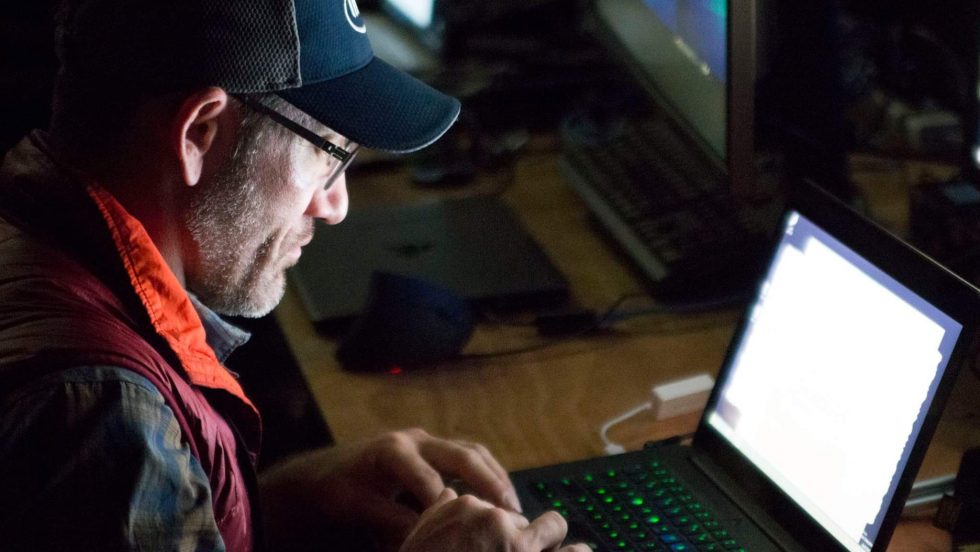A Philosopher in a Tech World

“When a new field is beginning to merge, we don’t have models yet to do work in that field. So, we import imperfect models from other fields, we mash them together, we try a bunch of stuff. Those ambiguous spaces are really interesting to me, those are the places I like to work.”
Robert isn’t the usual techie. He came to New College of Florida at first for creative writing but then turned to philosophy and history. He learned that logic is not just a tool for analysis. “When I saw that I could use logic in order to create and combine analysis and creativity, the doors opened and that’s largely been my career path ever since.”
Having a side interest in computers, Robert began working at the computer lab while attending New College. That led him to University of South Florida after graduation, where he and his team taught professors new technologies as they emerged. He decided to spend his summers at the European Graduate School in Sass-Fee, Switzerland to further his studies of philosophy. “I thought I would be a professor forever and pursue graduate studies somewhere where I would have a more established traditional graduate program that would help me along the path of tenure as I became a professor. I ended up at this crazy school that was radical in the tradition of New College and Black Mountain School.”
The day he became a Ph.D candidate, he had a conversation with Ringling School of Art + Design and was hired to create their new game design program. He applied his philosophy training to game design. “In philosophy, we take experiential and communicated data and create explanatory sense-making models in order to process ourselves in the world. In game design, you go the other way. There’s a practice called “world building” – and to me, it was similar to philosophy but inverting the inputs and outputs. I design the experience I want you to have by constructing a web of narrative artifacts in coherent relations rather than taking the experience and constructing a web of narrative out of it.”
Robert stayed at Ringling for six years, when he was approached by Intel. It was 2012 and the company had created a new program called Perceptual Computing. “Up to that point, humans had been putting data into machines for the most part. We were just getting to that point when machines could not only sense but perceive. This is where philosophy comes back in. What’s the difference between sensing and perception? What’s the difference between perception and understanding? I couldn’t stop thinking about it.” He was hired and has been at Intel ever since. He has had many different roles in different groups. His titles have included prototyper, design lead, research scientist, and experience architect. “I just kind of fill interesting roles as they come,” he says.
Robert cites his college experience as being instrumental in the roles he has held and the trajectory of his career path. “At New College, we learned how to learn, how to go into a space we knew nothing about and largely be independently researching and learning. With new fields, that’s what you have to do, because there isn’t material.”
He credits Philosophy Professor Douglas Berggren with helping him to discover his own learning styles. “I learned how to do close readings. I can deconstruct a text. I can’t read without a highlighter, a black pen, and a red pen. It allows me to read closely to model the thinking, mark interesting points for further investigation, then scan a text quickly for what I am looking for.”
From Professor Justus Doenecke who was his history mentor, Robert learned more than he thought he could. “He set a very high bar. I found out I could learn faster than I thought I could. I could recall more than I thought I could. I found ways of understanding more quickly than I thought I could. The train was moving, you had to catch up or be left behind.” He also says Professor Doenecke was really there for him as a mentor. “If I needed a conversation he was always ready for office hours. In a heartbeat.”
Those lessons from his New College professors helped shape the leader Robert is today. His viewpoint on leadership is simple. “If you build the right culture, bring in the right people and give them opportunities, people who are ready for that in their lives, then fantastic things happen.”
Although Robert has received much acclaim, he remains modest. “The best leaders are usually not in the front. They shine a light on others. One of the biggest challenges is that I can be working on projects and if I’m the face, the one making the decisions or guiding the unfolding path, I get credit for it. But the reality is, I’m not doing all that work. There are great people, applying fantastic effort, so I have to go out of my way to be constantly redirecting that light to the appropriate parties. Because when they grow, I grow.”
